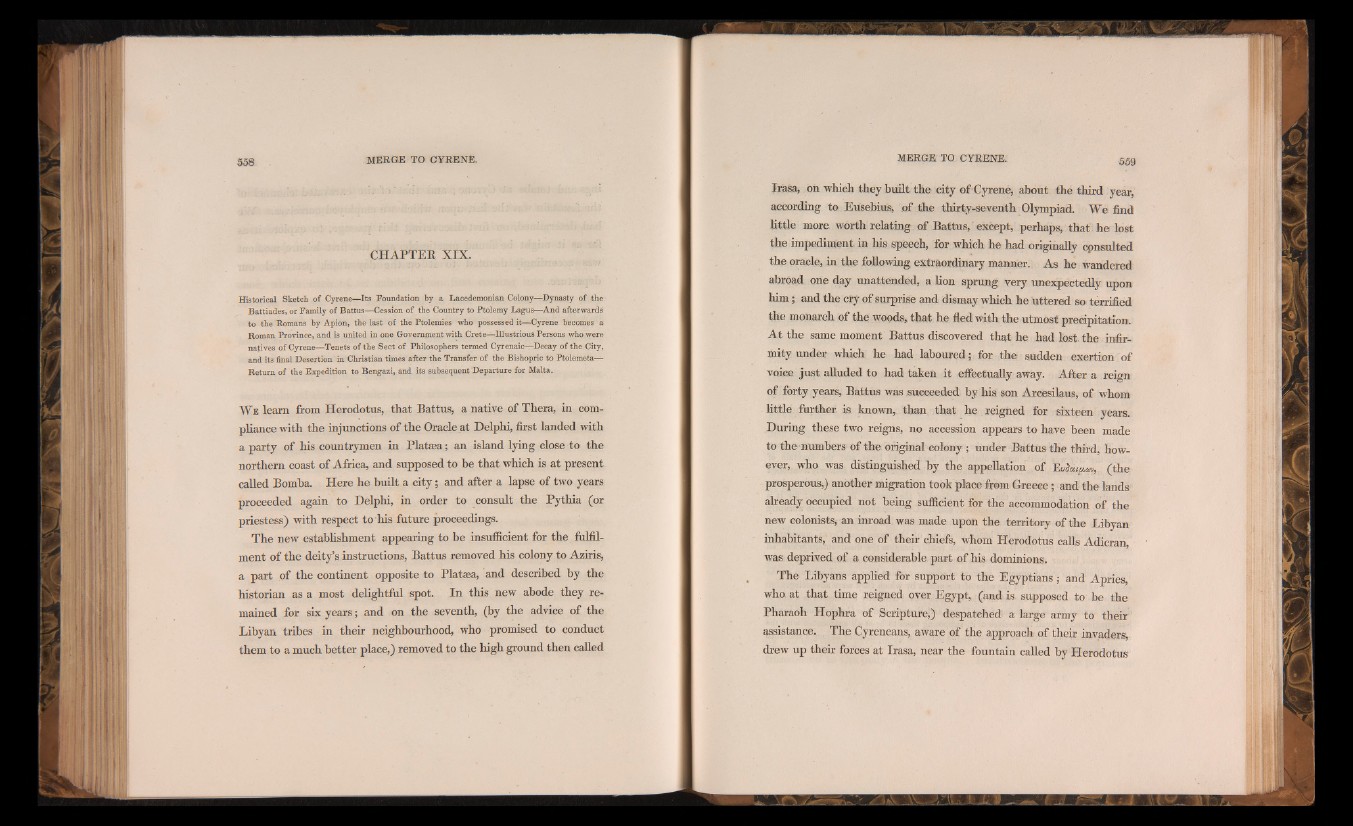
CHAPTER XIX.
Historical Sketch of Cyrene—Its Foundation by a Lacedemonian Colony—Dynasty of the
Battiades, or Family of Battus—Cession of the Country to Ptolemy Lagus—And afterwards
to the Romans by Apion, the last of the Ptolemies who possessed it—Cyrene becomes a
Roman Province, and is united in one Government with Crete—Illustrious Persons who were
natives of Cyrene—Tenets of the Sect of Philosophers termed Cyrenaic—Decay of the City,
and its final Desertion in Christian times after the Transfer of the Bishopric to Ptolemeta—
Return of the Expedition to Bengazi, and its subsequent Departure for Malta.
W e learn from Herodotus, that Battus, a native of Thera, in compliance
with the injunctions of the Oracle at Delphi, first landed with
a party of his countrymen in Platasa; an island lying close to the
northern coast of Africa, and supposed to be that which is at present
called Bomba. Here he built a city; and after a lapse of two years
proceeded again to Delphi, in order to consult the Pythia (or
priestess) with respect to his future proceedings.
The new establishment appearing to be insufficient for the fulfilment
of the deity’s instructions, Battus removed his colony to Aziris,
a part of the continent opposite to Platsea, and described by the
historian as a most delightful spot. In this new abode they remained
for six years; and on the seventh, (by the advice of the
Libyan tribes in their neighbourhood, who promised to conduct
them to a much better place,) removed to the high ground then called
Irasa, on whieh they built the city of Cyrene, about the third year,
according to Eusebius, of the thirty-seventh Olympiad. We find
little more worth relating of Battus, except, perhaps, that he lost
the impediment in his speech, for which he had originally cpnsulted
the oracle, in the following, extraordinary manner. As he wandered
abroad one day unattended, a lion sprung very unexpectedly upon
him; and the cry of surprise and dismay which he uttered so terrified
the monarch of the woods, that he fled with the utmost precipitation.
At the same moment Battus discovered that he had lost the infirmity
under which he had laboured; for the sudden exertion of
voice just alluded to had taken it effectually away. After a reign
of forty years, Battus was succeeded by his. son Areesilaus, of whom
little further is known, than that he reigned for sixteen years.
During these two reigns, no accession appears to have been made
to the numbers of the original colony ; under Battus the third, however,
who was distinguished by the appellation of lhiaiftm, (the
prosperous,) another migration took place from Greece; and tin; lands
already occupied not being sufficient for the accommodation of the
new colonists, an inroad was made upon the territory of the Libyan
inhabitants, and one of their chiefs, whom Herodotus calls Adicran,
was deprived of a considerable part of his dominions.
The Libyans applied for support to the Egyptians) 'and Apries,
who at that time reigned over Egypt, (and is supposed to be the
Pharaoh Hophra of Scripture^) despatched a large army to their
assistance. The Cyreneans, aware of the approach of their invaders,
drew up their forces at Irasa, near the fountain called by Herodotus